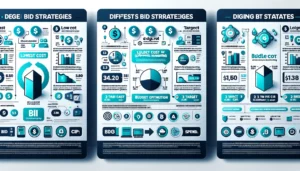PPC Ad Spend: 5 Strategies for Balancing and Maximising Campaign Impact

In the competitive world of digital advertising, effectively managing your PPC ad spend is crucial for maximising campaign impact. Knowing how to allocate funds can mean the difference between a successful campaign and one that falls flat. This article explores 5 strategies to balance your ad budget to ensure you’re getting the most out of every dollar spent.
Key Takeaways
- Refine your audience targeting and leverage Meta‘s technologies to improve ad relevance and efficiency.
- Optimise your ad creative by testing and iterating designs to enhance engagement and conversion rates.
- Smartly execute bid strategies by understanding and utilising different bidding options to maximise ROI.
- Employ retargeting tactics to re-engage previous visitors and increase the likelihood of conversion.
- Incorporate regular reporting and analysis to make data-driven decisions for budget reallocation and campaign optimisation.
1. Balancing Your PPC Ad Spend: Refine Audience Targeting and Utilise Meta Technologies
To ensure your ad budget is not squandered on indifferent eyes, refine your audience targeting with precision. Utilise Meta’s Audience Insights to delve into the demographics, interests, and behaviours of your potential customers. This isn’t just about gathering data; it’s about translating insights into actionable strategies that resonate with your audience.
Segmentation is key. Break down your audience into manageable groups based on factors like purchase history or engagement level. By doing so, you can tailor your ads to speak directly to each segment, maximizing relevance and impact.
Remember, a well-defined audience is the cornerstone of any successful ad campaign. It’s not just about reaching people; it’s about reaching the right people.
Leverage lookalike audiences to expand your reach to individuals who share characteristics with your best customers. This approach helps you find new prospects who are more likely to be interested in your offerings. And don’t forget about Custom Audiences – a powerful way to reconnect with individuals who have already shown interest in your brand. Whether they’ve visited your website or engaged with your content, these are the people who are primed to hear more from you.
2. Balancing Your PPC Ad Spend: Optimise Ad Creative
Your ad creative is the digital handshake with your potential customers, and optimising it is crucial for the success of your Google Ads PPC and Google Adwords PPC campaigns. Crafting ads in optimal formats is your starting point. High-quality images and videos are non-negotiable; they must be sharp and reflect your message across various devices and platforms.
- Provide High-Quality Images and Videos
- Use common sizes like 1920×1080, 1080×1080, 1080×1920, and 1350×1080.
Testing and iterating your creatives is essential. Employ A/B testing to discern which ads resonate with your audience. Start small to minimise risk and scale up based on insights gained. This approach is not just for large Google advertising agencies; even a local London PPC agency can execute this effectively.
Refinement doesn’t end with visuals. Use Meta’s Audience Insights to tailor your messaging, ensuring your ads strike a chord with your target demographic.
Remember, a PPC agency, especially a PPC eCommerce agency, thrives on continuous improvement. Whether you’re a seasoned PPC management professional or a boutique PPC ad agency, leveraging tools like a PPC audit or a Google ads audit can uncover areas for enhancement. As an eCommerce PPC expert, you know the value of every click. So, make each one count.
3. Balancing Your PPC Ad Spend: Execute Bid Strategies Smartly
To truly maximise your ad campaign’s impact, you need to execute bid strategies smartly. Start by understanding the different bid strategies available and how they align with your campaign goals. For instance, if you’re aiming for the highest volume within your budget, you might opt for a ‘Lowest Cost’ bid strategy without a bid cap. Conversely, if you’re targeting a specific return on ad spend (ROAS), you’ll want to set a bid cap to maintain control over your spending.
- Lowest Cost: Seek the highest number of results within your budget.
- Target Cost: Aim for a consistent cost per result.
- Bid Cap: Control the maximum bid for your ads.
Remember, the key is to test and iterate. Start with a small budget, analyse performance, and adjust your bids accordingly. As you gather data, refine your approach to find the sweet spot between cost and results. Don’t be afraid to adjust your strategies mid-campaign based on real-time insights.
By smartly executing bid strategies, you not only optimise your budget but also enhance the overall efficiency and effectiveness of your campaigns. This strategic approach ensures that every dollar spent is an investment towards achieving your desired outcomes.
4. Balancing Your PPC Ad Spend: Deploy Retargeting
Retargeting is not just a tactic; it’s a strategic necessity in the realm of digital advertising. By focusing on individuals who have already shown interest in your brand, you’re investing in a higher probability of conversion. Deploy retargeting to re-engage these warm leads and remind them of the value you offer.
Retargeting works by keeping your brand in the limelight, nudging users who have interacted with your site or products to take the next step. Whether it’s completing a purchase, signing up for a newsletter, or exploring a new service, retargeting can be the gentle push needed to convert interest into action.
When setting up retargeting campaigns, consider segmenting your audience based on their interaction level. This allows for more personalised and effective ad experiences.
Here’s how you can segment your retargeting audience:
- Tier 1: Users who visited your homepage but didn’t engage further.
- Tier 2: Users who viewed specific products or services.
- Tier 3: Users who added items to their cart but didn’t complete the purchase.
Remember, the key to successful retargeting is relevance and timing. Monitor your campaign’s performance metrics closely, making incremental adjustments to budget or creatives as necessary. This ensures your retargeting efforts are as impactful as possible.
5. Balancing Your PPC Ad Spend: Regular Reporting and Analysis
To truly maximise the impact of your ad campaigns, you must embrace regular reporting and analysis. This is not just about collecting data; it’s about interpreting it to understand the efficacy of each dollar spent. Start by setting up a robust reporting system that breaks down spend by platform, campaign, ad group, and keyword. This granular view will illuminate the areas where your budget is performing well and where it’s not.
With a keen eye on performance metrics, you can swiftly identify trends and anomalies. An alerting system for irregularities, such as sudden spikes or drops in PPC spend, can be a lifesaver, enabling you to act quickly and adjust your strategies accordingly.
Understanding platform algorithms is crucial. These algorithms dictate how your budget is spent, and by getting to grips with them, you can optimise your spend for better results. Moreover, integrate AI-assisted budget pacing to ensure that your spending aligns with your campaign goals over time.
Lastly, don’t forget to:
- Track and align your efforts with business outcomes regularly.
- Develop a metrics ladder with leading and lagging indicators.
- Establish quarterly check-ins to assess the performance of your marketing plan.
By doing so, you’ll build confidence that every element of your marketing budget is driving ROI, and you’ll be well-equipped to pivot if certain components underperform.
Balancing Your PPC Ad Spend: Conclusion
In the dynamic world of digital advertising, balancing your ad budget is both an art and a science. By implementing the strategies discussed, from refining audience targeting to smart bid execution, you can maximise your campaign’s impact without overspending. Remember to regularly monitor performance metrics, adjust your campaigns based on insights, and understand the algorithms of different ad platforms. With a vigilant eye and a strategic approach, you can optimise your ad spend for better ROI and ensure that every dollar contributes to your business’s growth. As you continue to test, iterate, and analyse, your ad campaigns will become increasingly effective, driving success in a competitive digital marketplace.
Frequently Asked Questions
How can I refine audience targeting to improve ad performance?
Refine audience targeting by analysing your customer data and using Meta’s advanced targeting technologies to reach specific demographics, interests, and behaviours. Utilise lookalike audiences to find new users similar to your best customers.
What are some techniques to optimise ad creative?
Optimise ad creative by A/B testing different elements such as headlines, images, and calls-to-action. Use analytics to determine which creatives resonate most with your audience and refine your approach based on performance data.
What should I consider when executing bid strategies?
Understand the different bid strategies available, such as cost-per-click (CPC) or cost-per-acquisition (CPA), and choose the one that aligns with your campaign goals. Monitor and adjust bids based on performance metrics to maximise ROI.
How does retargeting enhance ad campaign impact?
Retargeting allows you to re-engage users who have previously interacted with your brand, increasing the likelihood of conversion. Deploy retargeting campaigns to remind users of their interest and drive them back to your site to complete a purchase.
Why is regular reporting and analysis crucial for ad budget management?
Regular reporting and analysis provide insights into campaign performance, allowing you to identify which areas are performing well and which need improvement. This enables you to reallocate your budget effectively to maximise campaign impact.
How can I balance my ad budget to avoid overspending?
Balance your ad budget by setting clear objectives, monitoring spending closely, and making incremental adjustments as needed. Use tools like Google Ads‘ budget simulator to forecast performance and reallocate funds from underperforming campaigns to optimise overall spend.
Author
Search Blog
Free PPC Audit
Subscribe to our Newsletter
The Voices of Our Success: Your Words, Our Pride
Don't just take our word for it. With over 100+ five-star reviews, we let our work-and our satisfied clients-speak for us.
"We have been working with PPC Geeks for around 6 months and have found Mark and the team to be very impressive. Having worked with a few companies in this and similar sectors, I rate PPC Geeks as the strongest I have come across. They have taken time to understand our business, our market and competitors and supported us to devise a strategy to generate business. I value the expertise Mark and his team provide and trust them to make the best recommendations for the long-term."
~ Just Go, Alasdair Anderson




